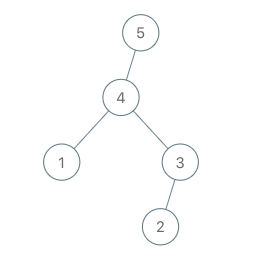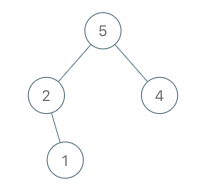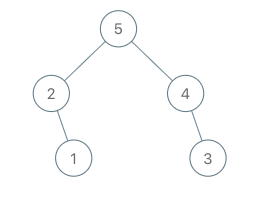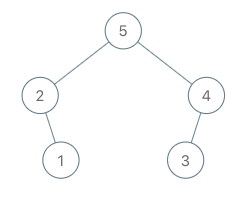二叉树
树
题目描述
最大树 定义:一棵树,并满足:其中每个节点的值都大于其子树中的任何其他值。
给你最大树的根节点 root 和一个整数 val 。
就像 之前的问题 那样,给定的树是利用 Construct(a) 例程从列表 a(root = Construct(a))递归地构建的:
如果 a 为空,返回 null 。
否则,令 a[i] 作为 a 的最大元素。创建一个值为 a[i] 的根节点 root 。
root 的左子树将被构建为 Construct([a[0], a[1], ..., a[i - 1]]) 。root 的右子树将被构建为 Construct([a[i + 1], a[i + 2], ..., a[a.length - 1]]) 。返回 root 。
请注意,题目没有直接给出 a ,只是给出一个根节点 root = Construct(a) 。
假设 b 是 a 的副本,并在末尾附加值 val。题目数据保证 b 中的值互不相同。
返回 Construct(b) 。
示例 1:
输入: root = [4,1,3,null,null,2], val = 5
输出: [5,4,null,1,3,null,null,2]
解释: a = [1,4,2,3], b = [1,4,2,3,5]
示例 2:
输入: root = [5,2,4,null,1], val = 3
输出: [5,2,4,null,1,null,3]
解释: a = [2,1,5,4], b = [2,1,5,4,3]
示例 3:
输入: root = [5,2,3,null,1], val = 4
输出: [5,2,4,null,1,3]
解释: a = [2,1,5,3], b = [2,1,5,3,4]
提示:
树中节点数目在范围 [1, 100] 内
1 <= Node.val <= 100树中的所有值 互不相同
1 <= val <= 100
解法
方法一:递归
如果 \(val\) 是最大数,那么将 \(val\) 作为新的根节点,\(root\) 作为新的根节点的左子树。
如果 \(val\) 不是最大数,由于 \(val\) 是在最后追加的数,那么一定是在 \(root\) 的右边,所以将 \(val\) 作为新节点插入 \(root\) 的右子树即可。
时间复杂度 \(O(n)\) ,空间复杂度 \(O(n)\) 。其中 \(n\) 是树的节点数。
Python3 Java C++ Go TypeScript Rust C
1
2
3
4
5
6
7
8
9
10
11
12
13
14 # Definition for a binary tree node.
# class TreeNode:
# def __init__(self, val=0, left=None, right=None):
# self.val = val
# self.left = left
# self.right = right
class Solution :
def insertIntoMaxTree (
self , root : Optional [ TreeNode ], val : int
) -> Optional [ TreeNode ]:
if root is None or root . val < val :
return TreeNode ( val , root )
root . right = self . insertIntoMaxTree ( root . right , val )
return root
1
2
3
4
5
6
7
8
9
10
11
12
13
14
15
16
17
18
19
20
21
22
23
24 /**
* Definition for a binary tree node.
* public class TreeNode {
* int val;
* TreeNode left;
* TreeNode right;
* TreeNode() {}
* TreeNode(int val) { this.val = val; }
* TreeNode(int val, TreeNode left, TreeNode right) {
* this.val = val;
* this.left = left;
* this.right = right;
* }
* }
*/
class Solution {
public TreeNode insertIntoMaxTree ( TreeNode root , int val ) {
if ( root == null || root . val < val ) {
return new TreeNode ( val , root , null );
}
root . right = insertIntoMaxTree ( root . right , val );
return root ;
}
}
1
2
3
4
5
6
7
8
9
10
11
12
13
14
15
16
17
18
19 /**
* Definition for a binary tree node.
* struct TreeNode {
* int val;
* TreeNode *left;
* TreeNode *right;
* TreeNode() : val(0), left(nullptr), right(nullptr) {}
* TreeNode(int x) : val(x), left(nullptr), right(nullptr) {}
* TreeNode(int x, TreeNode *left, TreeNode *right) : val(x), left(left), right(right) {}
* };
*/
class Solution {
public :
TreeNode * insertIntoMaxTree ( TreeNode * root , int val ) {
if ( ! root || root -> val < val ) return new TreeNode ( val , root , nullptr );
root -> right = insertIntoMaxTree ( root -> right , val );
return root ;
}
};
1
2
3
4
5
6
7
8
9
10
11
12
13
14
15 /**
* Definition for a binary tree node.
* type TreeNode struct {
* Val int
* Left *TreeNode
* Right *TreeNode
* }
*/
func insertIntoMaxTree ( root * TreeNode , val int ) * TreeNode {
if root == nil || root . Val < val {
return & TreeNode { val , root , nil }
}
root . Right = insertIntoMaxTree ( root . Right , val )
return root
}
1
2
3
4
5
6
7
8
9
10
11
12
13
14
15
16
17
18
19
20
21 /**
* Definition for a binary tree node.
* class TreeNode {
* val: number
* left: TreeNode | null
* right: TreeNode | null
* constructor(val?: number, left?: TreeNode | null, right?: TreeNode | null) {
* this.val = (val===undefined ? 0 : val)
* this.left = (left===undefined ? null : left)
* this.right = (right===undefined ? null : right)
* }
* }
*/
function insertIntoMaxTree ( root : TreeNode | null , val : number ) : TreeNode | null {
if ( ! root || root . val < val ) {
return new TreeNode ( val , root );
}
root . right = insertIntoMaxTree ( root . right , val );
return root ;
}
1
2
3
4
5
6
7
8
9
10
11
12
13
14
15
16
17
18
19
20
21
22
23
24
25
26
27
28
29
30
31
32
33
34
35
36
37
38
39 // Definition for a binary tree node.
// #[derive(Debug, PartialEq, Eq)]
// pub struct TreeNode {
// pub val: i32,
// pub left: Option<Rc<RefCell<TreeNode>>>,
// pub right: Option<Rc<RefCell<TreeNode>>>,
// }
//
// impl TreeNode {
// #[inline]
// pub fn new(val: i32) -> Self {
// TreeNode {
// val,
// left: None,
// right: None
// }
// }
// }
use std :: cell :: RefCell ;
use std :: rc :: Rc ;
impl Solution {
pub fn insert_into_max_tree (
mut root : Option < Rc < RefCell < TreeNode >>> ,
val : i32 ,
) -> Option < Rc < RefCell < TreeNode >>> {
if root . is_none () || root . as_ref (). unwrap (). as_ref (). borrow (). val < val {
return Some ( Rc :: new ( RefCell :: new ( TreeNode {
val ,
left : root . take (),
right : None ,
})));
}
{
let mut root = root . as_ref (). unwrap (). as_ref (). borrow_mut ();
root . right = Self :: insert_into_max_tree ( root . right . take (), val );
}
root
}
}
1
2
3
4
5
6
7
8
9
10
11
12
13
14
15
16
17
18
19
20 /**
* Definition for a binary tree node.
* struct TreeNode {
* int val;
* struct TreeNode *left;
* struct TreeNode *right;
* };
*/
struct TreeNode * insertIntoMaxTree ( struct TreeNode * root , int val ) {
if ( ! root || root -> val < val ) {
struct TreeNode * res = ( struct TreeNode * ) malloc ( sizeof ( struct TreeNode ));
res -> val = val ;
res -> left = root ;
res -> right = NULL ;
return res ;
}
root -> right = insertIntoMaxTree ( root -> right , val );
return root ;
}
方法二:迭代
搜索右子树,找到 \(curr.val \gt val \gt curr.right.val\) 的节点,然后创建新的节点 \(node\) ,把 \(node.left\) 指向 \(curr.right\) ,然后 \(curr.right\) 指向 \(node\) 。
最后返回 \(root\) 。
时间复杂度 \(O(n)\) ,其中 \(n\) 是树的节点数。空间复杂度 \(O(1)\) 。
Python3 Java C++ Go TypeScript
1
2
3
4
5
6
7
8
9
10
11
12
13
14
15
16
17
18
19 # Definition for a binary tree node.
# class TreeNode:
# def __init__(self, val=0, left=None, right=None):
# self.val = val
# self.left = left
# self.right = right
class Solution :
def insertIntoMaxTree (
self , root : Optional [ TreeNode ], val : int
) -> Optional [ TreeNode ]:
if root . val < val :
return TreeNode ( val , root )
curr = root
node = TreeNode ( val )
while curr . right and curr . right . val > val :
curr = curr . right
node . left = curr . right
curr . right = node
return root
1
2
3
4
5
6
7
8
9
10
11
12
13
14
15
16
17
18
19
20
21
22
23
24
25
26
27
28
29
30 /**
* Definition for a binary tree node.
* public class TreeNode {
* int val;
* TreeNode left;
* TreeNode right;
* TreeNode() {}
* TreeNode(int val) { this.val = val; }
* TreeNode(int val, TreeNode left, TreeNode right) {
* this.val = val;
* this.left = left;
* this.right = right;
* }
* }
*/
class Solution {
public TreeNode insertIntoMaxTree ( TreeNode root , int val ) {
if ( root . val < val ) {
return new TreeNode ( val , root , null );
}
TreeNode curr = root ;
TreeNode node = new TreeNode ( val );
while ( curr . right != null && curr . right . val > val ) {
curr = curr . right ;
}
node . left = curr . right ;
curr . right = node ;
return root ;
}
}
1
2
3
4
5
6
7
8
9
10
11
12
13
14
15
16
17
18
19
20
21
22
23 /**
* Definition for a binary tree node.
* struct TreeNode {
* int val;
* TreeNode *left;
* TreeNode *right;
* TreeNode() : val(0), left(nullptr), right(nullptr) {}
* TreeNode(int x) : val(x), left(nullptr), right(nullptr) {}
* TreeNode(int x, TreeNode *left, TreeNode *right) : val(x), left(left), right(right) {}
* };
*/
class Solution {
public :
TreeNode * insertIntoMaxTree ( TreeNode * root , int val ) {
if ( root -> val < val ) return new TreeNode ( val , root , nullptr );
TreeNode * curr = root ;
TreeNode * node = new TreeNode ( val );
while ( curr -> right && curr -> right -> val > val ) curr = curr -> right ;
node -> left = curr -> right ;
curr -> right = node ;
return root ;
}
};
1
2
3
4
5
6
7
8
9
10
11
12
13
14
15
16
17
18
19
20
21 /**
* Definition for a binary tree node.
* type TreeNode struct {
* Val int
* Left *TreeNode
* Right *TreeNode
* }
*/
func insertIntoMaxTree ( root * TreeNode , val int ) * TreeNode {
if root . Val < val {
return & TreeNode { val , root , nil }
}
node := & TreeNode { Val : val }
curr := root
for curr . Right != nil && curr . Right . Val > val {
curr = curr . Right
}
node . Left = curr . Right
curr . Right = node
return root
}
1
2
3
4
5
6
7
8
9
10
11
12
13
14
15
16
17
18
19
20
21
22
23
24
25
26
27 /**
* Definition for a binary tree node.
* class TreeNode {
* val: number
* left: TreeNode | null
* right: TreeNode | null
* constructor(val?: number, left?: TreeNode | null, right?: TreeNode | null) {
* this.val = (val===undefined ? 0 : val)
* this.left = (left===undefined ? null : left)
* this.right = (right===undefined ? null : right)
* }
* }
*/
function insertIntoMaxTree ( root : TreeNode | null , val : number ) : TreeNode | null {
if ( root . val < val ) {
return new TreeNode ( val , root );
}
const node = new TreeNode ( val );
let curr = root ;
while ( curr . right && curr . right . val > val ) {
curr = curr . right ;
}
node . left = curr . right ;
curr . right = node ;
return root ;
}






